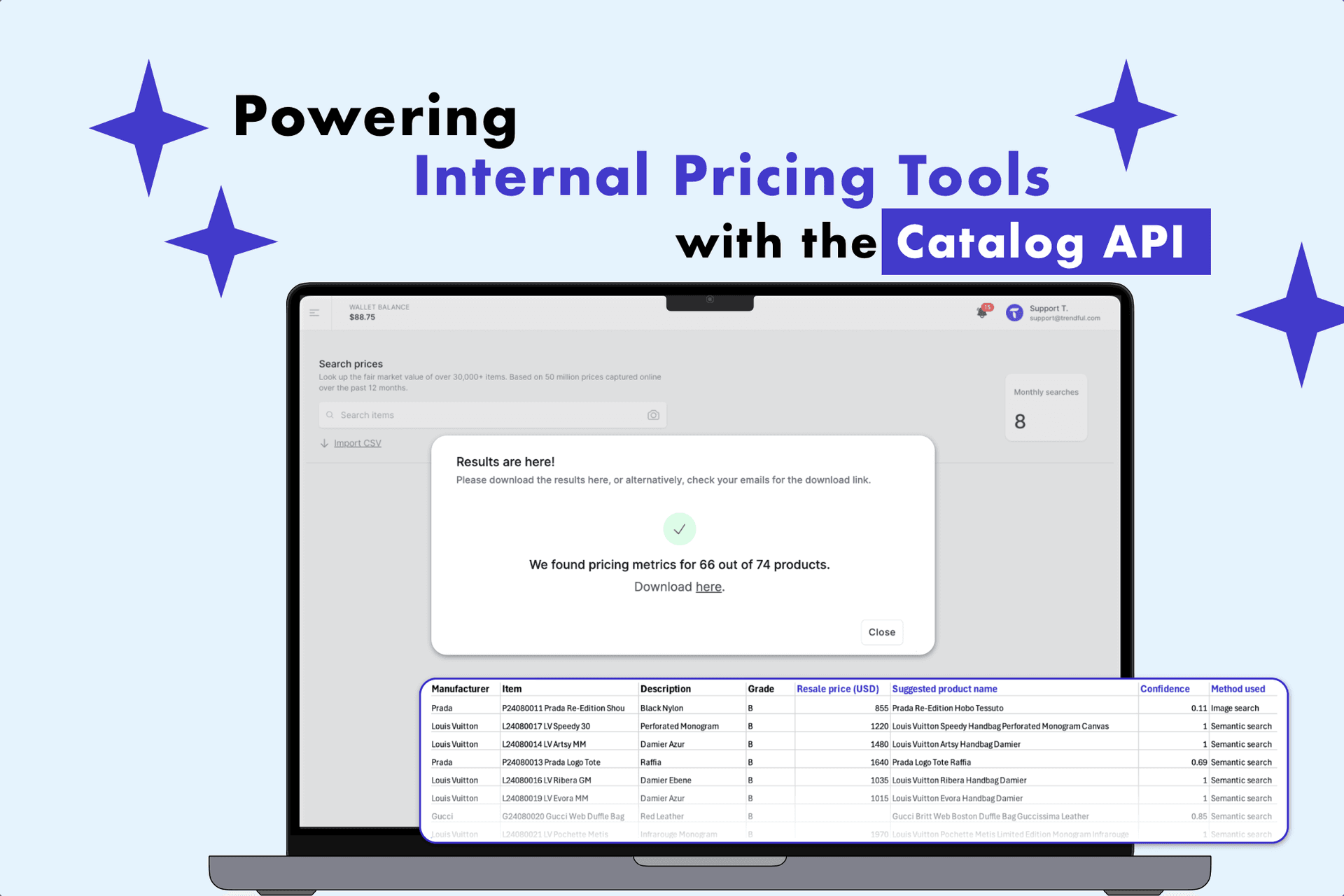
The Trendful Catalog API isn't just for powering customer-facing resale experiences; it’s also a powerful engine for building internal pricing dashboards and automation tools. In this article, we explore how merchants, wholesalers, and resale platforms are leveraging the API to make better, faster pricing decisions at scale.
From Guesswork to Data-Driven Pricing
Whether you’re managing hundreds of SKUs as a wholesaler or operating a resale business across multiple categories, pricing is one of the most complex and time-consuming challenges. The Catalog API helps reduce that friction by giving your team access to:
- Fair Market Values (FMVs) based on product condition
- Historical and recent price trends across resale platforms
- Popularity signals to help prioritize pricing decisions
- Hierarchical product data so you can anchor pricing at the right level (model, style, variant)
With this data available on demand, teams can build internal pricing dashboards or automated pricing scripts that reflect the real resale market, updated weekly.
Example: A Wholesaler Setting Prices for Incoming Inventory
Imagine a watch wholesaler receiving 50+ timepieces a week from suppliers. Instead of manually researching resale prices for each item, the team builds an internal dashboard powered by the Catalog API:
- The team inputs product details (brand, model, case, dial)
- The API returns structured product metadata and FMV estimates by condition
- The dashboard highlights price ranges and historical volatility
- Pricing managers set acquisition and resale prices with confidence, backed by real market data
This eliminates guesswork, speeds up workflows, and helps ensure that margin targets are consistently met.
Example: Automated Quote Ranges for Trade-In Programs
Retailers expanding into resale or trade-in can also use the Catalog API behind the scenes to automate quote logic. Based on a customer's product submission, the system can instantly:
- Identify the correct reference
- Assess fair market value by condition
- Return a dynamic quote (e.g., offer 60–70% of FMV)
This approach powers instant trade-in offers without needing a full front-end resale app.
Why It Works
Behind the scenes, Trendful’s data engine pulls from:
- Over 30 million price points
- 300+ resale vendors
- Weekly updates with 200,000+ new listings
- A hierarchically organized catalog of over 65,000 designer handbag and watch references
This makes the Catalog API uniquely suited to support enterprise-grade pricing decisions, from rough appraisals to dynamic pricing logic.
Who Is This For?
This use case is ideal for:
- Wholesalers and consignment platforms pricing large volumes of incoming inventory
- Merchants managing pricing operations across multiple resale channels
- Retailers launching trade-in programs or secondary marketplaces
- Pricing teams looking to automate part of their appraisal process
If you're trying to bring consistency, speed, and data integrity to your pricing process, the Catalog API is designed to help.
Coming Next: Enriching Authentication Services with Catalog Intelligence
In the next article, we’ll explore how authentication services and related platforms can integrate the Catalog API to deliver more value to users. By connecting product identification with market insights, like pricing ranges, product popularity, and resale potential, authentication services can do more than verify a product’s legitimacy. They can become data-driven resale enablement platforms.
We’ll cover how:
- Authenticators can surface price ranges alongside verified items
- Image-based recognition (via Trendful Vision) can streamline ID + valuation
- Catalog data can help educate users on resale value, condition tiers, and market trends
- API insights can open up cross-sell opportunities with resale apps, trade-in tools, or insurance partners